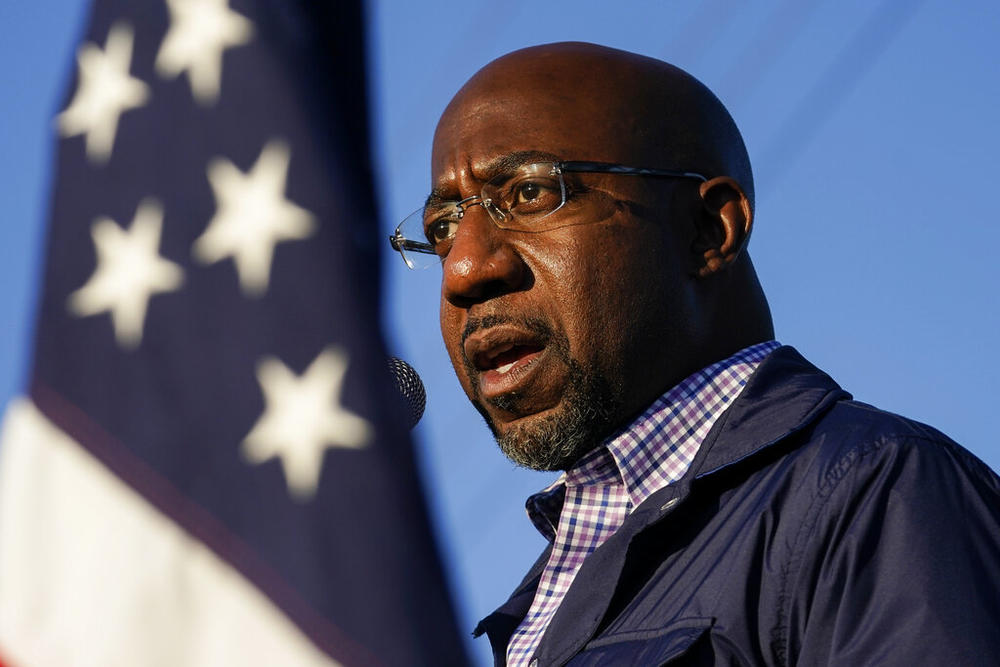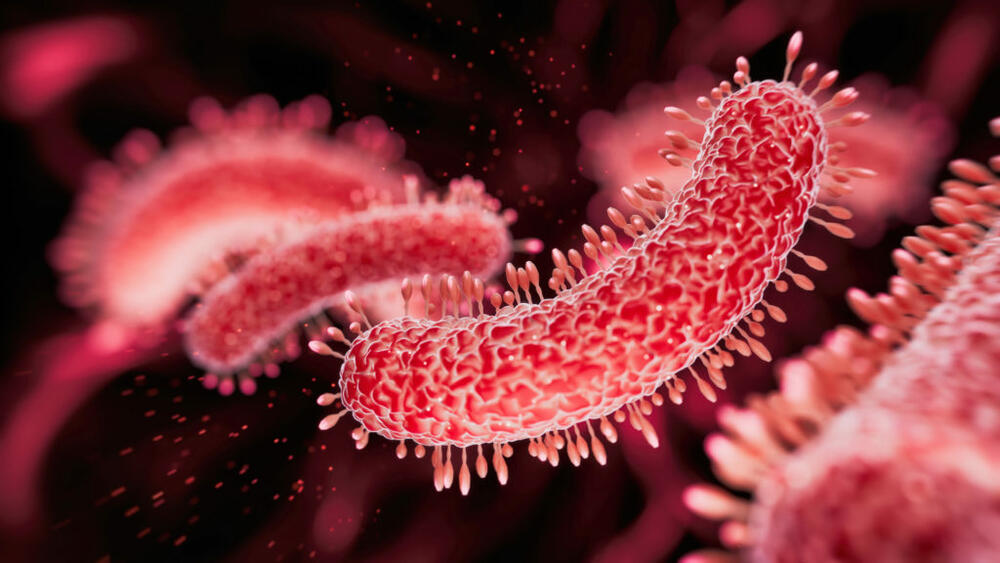
Section Branding
Header Content
Georgia Today: Family of man who died in Bibb jail preps civil lawsuit; Kemp considers Senate run
Primary Content
On the Thursday, April 10 edition of Georgia Today: The family of a man who died in the Macon-Bibb County jail prepares a civil lawsuit; Gov. Brian Kemp considers a senate run in 2026; and the Masters Tournament tees off in Augusta.

Peter Biello: Welcome to the Georgia Today podcast. Here, we feature the latest reports from the GPB News team. On today's episode, the family of a man who died in the Macon Bibb County Jail prepares a civil lawsuit. Gov. Brian Kemp considers a Senate run in 2026, and golf's most anticipated event, the Masters Tournament, tees off in Augusta.
Fred Ridley: Ladies and gentlemen, the 2025 Masters Tournament is now officially underway.
Peter Biello: Today's Thursday, April 10. I'm Peter Bielo, and you're listening to Georgia Today.
Story 1:
Peter Biello: Attorneys for the family of a mentally ill Macon man who died in the Bibb County jail after jailers stun-gunned him say they are preparing a civil lawsuit. GPB's Grant Blankenship has more.
Grant Blankenship: The legal challenge comes a day after Macon District Attorney Anita Howard released a statement saying she will not pursue criminal charges in the death of Stephen Fossett. Howard says Fossett was combative and high on synthetic cannabis during a 2024 altercation in the jail. Fossett's family says jailers should have recognized and treated Fossett's schizophrenia because of prior jail stays. Attorney Nathan Fitzpatrick says now he'll attempt to use Georgia Open Records Law to get his and the family's first look at the DA's evidence.
Nathan Fitzpatrick: From the GBI, from the district attorney's office, from the Beup County Sheriff's Office, from the Taser manufacturing companies, we want all the information that is available in this case, and we want it released pronto.
Grant Blankenship: The attorneys expect a response to their record request next week. For GPB News, I'm Grant Blankenship in Macon.

Story 2:
Peter Biello: Georgia U.S. Sen. Raphael Warnock introduced legislation yesterday to expand the federal child income tax credit. GPB's Sarah Kallis reports.
Sarah Kallis: The current child tax credit allows eligible families to reduce their federal income tax by up to $2,000 per child. Warnock, alongside other Democratic U.S. senators, introduced the legislation that would more than double that. Families could see a credit of over $4,000 for children under age six, and $3,600 for children six to 17.
Raphael Warnock: I want to give our moms and dads a break. I want give them an opportunity to thrive because we know that when ordinary people thrive, the whole economy thrives.
Sarah Kallis: Child poverty briefly plummeted during the COVID pandemic when the child tax credit was temporarily expanded only to rise again as those emergency benefits began to fade. If nothing changes now, the federal credit stands to fall again to half its current level. For GPB News, I'm Sarah Kallis in Atlanta.
Story 3:
Peter Biello: The chief medical officer at the Centers for Disease Control and Prevention this week told staff to start planning for the agency to be broken up. Most of CDC's workforce is based in Atlanta. The agency had about 13,000 employees at the beginning of the year. The Trump administration has reduced that number by at least 3,500. Federal health officials have until Monday to tell the White House how the remaining staff will be reorganized. Some could face relocation to Washington, D.C., something that experts warn could leads to further loss of agency talent if those workers are unable or unwilling to move.
Story 4:
Peter Biello: Gov. Brian Kemp says he is still weighing whether to run for U.S. Senate in 2026. The term-limited Republican answered questions yesterday about a potential run.
Brian Kemp: And then I'm gonna try to get a little bit of downtime where I can to kind of think through things, do some due diligence, and then we'll keep people posted.
Peter Biello: Kemp is facing pressure to announce a decision. Other GOP officials rumored to be considering a bid for the seat include Insurance Commissioner John King and U.S. Rep. Marjorie Taylor Greene. Incumbent Democratic U. S. Sen. John Ossoff so far this year has raised $11 million for his campaign.

Story 5:
Peter Biello: The Georgia Department of Public Health tested about 130 students and staff at Fitzgerald High School College and Career Academy for tuberculosis yesterday. This came after a student at the school in South Georgia's Ben Hill County tested positive for the infection. The agency says nurses will return to the school tomorrow to share preliminary results from the tests. A similar case in metro Atlanta's Cobb County last October resulted in 300 students being tested. In that case, the infection did not spread beyond the original student exposed. Preliminary data released last month by the Centers for Disease Control and Prevention showed TB rising in the U.S. to its highest levels in more than a dozen years. CDC officials say the rise is mainly due to international travel and migration.
Story 6:
Peter Biello: It is turkey hunting season in Georgia, and with the spread of bird flu in wild birds, some hunters might be worried about sick turkeys. As GPB's Chase McGee explains, the risk is relatively low.
Chase McGee: Nicole Nemeth is the head of the Southeastern Cooperative Wildlife Disease Study Diagnostic Service. She says that both behaviorally and biologically, turkeys are just different than the wild ducks that more commonly spread avian influenza.
Nicole Nemeth: Turkeys aren't going to be spending a lot of time in the water, they're not going to be ingesting in lots and lots of water. They just take little drinks of what they need and then they're going to move on.
Chase McGee: Turkeys are also a prey species, so they don't do other things that spread bird flu, like hang out in big flocks or feed on the remains of other sick birds. Georgia's Department of Natural Resources has other bird flu tips for turkey hunters. Nemeth says hunters should report sick or dead birds to DNR, too. For GPB News, I'm Chase McGee.
Story 7:
Peter Biello: The district attorney in metro Atlanta's Clayton County says her office found out on Monday that a convicted killer was mistakenly released from the county jail. In a statement this morning, DA Tasha Mosley said the county sheriff has confirmed the erroneous release of Kathan Guzman. GPB's requests for more information from the sheriff's office have gone unreturned. A jury last October convicted Guzmán of felony murder for the 2022 choking death of 19-year-old Delilah Grayson. A judge sentenced him to life in prison. He's now on the run.
Story 8:
Peter Biello: Tariffs proposed by President Donald Trump have upended U.S. trade policy and created significant uncertainty in the marketplace. A new report by the Georgia Chamber of Commerce suggests that Georgia businesses and consumers may face higher prices as a result of these tariffs, but some domestic companies that compete with counterparts overseas could see their fortunes improve. With me now to discuss this is Chris Clark, President and CEO of the Georgia Chamber of Commerce. Thank you so much for speaking with me.
Chris Clark: Thanks for having me, Peter.
Peter Biello: Changes have been made to President Trump's tariff since the publication of this tariff briefing. So would any of those modifications change the conclusions that you reached?
Chris Clark: What we saw yesterday was a 90-day delay in many of the reciprocal tariffs. Obviously, the tariffs on Chinese goods and products remained high and actually went up. The 10% baseline tariffs remained into place. The threat of additional tariffs on pharmaceuticals, precious metals remained in place and expect those sometime in the next few weeks. I think our report, which was really meant to help Georgia businesses maneuver through this very disruptive period, I think it stands. I don't think we change any of our outcomes or recommendations to our members. It's just constantly trying to keep them updated and the general public updated on both what the administration in Washington does, but also what other countries are doing in response as we move through the next 90 days.
Peter Biello: And the Georgia Chamber of Commerce tariffs briefing broke down how different sectors of Georgia's economy may feel the impact of these tariffs. So I wanted to talk a little bit about a few of those and wanted to start with agriculture since it's such a huge part of the state's economy. Georgia's a leading exporter of poultry, peanuts, timber, paper products. How might these tariffs impact Georgia's farmers?
Chris Clark: So I think from the agricultural standpoint, what we're most concerned about right now would be the reciprocal tariffs, and so hearing that some of those were canceled or delayed yesterday is obviously a sigh of relief to our farmers in Georgia, but that's what you're careful of. Listen, Georgia farmers are selling their goods and products all over the world. Between them and manufacturers, we're in 292 markets somewhere around the world. and so making sure that someone doesn't input another barrier to them selling pecans or peanuts somewhere i think is very important. And we did see that, right? We saw early about a month ago potential reciprocal tariffs would made it more difficult to ship Georgia peanut products — from particularly, from Fitzgerald, Ga., around the world. And so that's been our biggest concern and remains there. Not so much in Georgia, but we've heard from other partners with ag states that have said farmers were delaying their plantings, but — until they had some clarity, they didn't want to lose their product that they would normally sell in an Asian market or European market. Haven't heard that as much in Georgia, but I know that's on a lot of folks' minds.
Peter Biello: What about the steel and aluminum industry and the tariffs there? Would those tariffs be a good thing for Georgia steel fabricators?
Chris Clark: Well i think there's — there's two parts here so we do have some steel fabricating, but when you look at them the manufacturing of those steel products, construction could slow down. Road building can slow down. Where you — we're importing steel, we're actually important concrete from all over the world i have any concrete, uh — owned companies in the U.S. anymore. So there's lots of ways that this could be an impact. Do we think there's opportunities out there? Absolutely and we're encouraging Georgia manufacturers to look into the state for some of the other fabricators, but when you start talking about those big steel mills, those big plants, most of those products are coming from overseas and could slow down product development. Construction, particularly, should continue to be a concern.
Peter Biello: And does a slowdown translate to higher prices for consumers down the line?
Chris Clark: I think so. I think we're already seeing some of that right now. I think you'll continue to see some of it. I think particularly in the ag space, if we're putting tariffs, we're seeing — if you're putting the 10% tariffs on all goods, and then you have to realize fruits, vegetables, things we might bring in from Mexico or from South America is going to be impacted immediately at the grocery store. But then a lot of the stuff that we order online, a lot of the goods and products in our retail markets are already going to see the 10% tariffs or the reciprocal impact of those to drive up prices. So I do think consumers are feeling that crunch and they'll continue to do so as we maneuver through this, you know, this tricky next 90 days.
Peter Biello: The Port of Brunswick handles a lot of imported vehicles. Would tariffs change what happens at the port of Brunswick? And if so, how?
Chris Clark: Yes, I think there's two parts of that, right? So there's the immediacy which we're seeing: a huge increase in volume as, particularly, luxury automakers that aren't in the U.S. import more product into America to get it into the market before the tariffs go to effect. So you're seeing little bit of a boom right now. If these tariffs go into effect in 90 days, then you're not going to see as many Mercedes-Benz come through the port. And then likewise we send out a lot of what we build here in Georgia, whether it's in Savannah or — or West Point or in Tennessee with Volkswagen or Hyundai in Alabama. You're seeing a lot of those products be exported through the portas of Brunswick. And so if reciprocal tariffs go into place, we might not sell as many vehicles to Dubai or to other countries around the world. So yeah, there's a potential for an impact, I think more so there over the long term with these tariffs than maybe the port of Savannah, which I think is obviously is a more diversified port and doing extremely well right now.
Peter Biello: Your report advises Georgia businesses to take a quote, "proactive" stance in the face of these changes. What does that mean?
Chris Clark: I think you're seeing, particularly, large companies have been very proactive, right? They've read the tea leaves, they've heard what the administration has been saying since they came into office in January. And so they've stockpiled goods and products, they brought in additional supply chains. Some have been thinking about this for years and have already reordered their supply chains. I think where it gets more difficult for the mid-cap size companies and small companies that don't have the capital to buy long term, maybe that are living month to month. They can't stockpile. They don't have that ability. So i think they're gonna they're starting to see the impact — that's who i'm hearing the most from right now. And so we're encouraging companies 1) to be patient; think long-term, don't overreact, stockpile when you can, rethink your supply chains. And then for some companies that are operating — maybe they're manufacturing around the world, but they're selling heavily in the U.S. — they need to follow the lead of of dozens of other companies that Gov.Kemp's helped to recruit here and to open facilities in America. And I think that's where, you know, I think there are two potential positives through all of this. One is more foreign direct investment, and the second is to open new markets to Georgia goods and products and to our farmers.
Peter Biello: Chris Clark is president and CEO of the Georgia Chamber of Commerce. Thank you so much for speaking with me.
Chris Clark: Thanks, Peter. Appreciate all you do.

Story 9:
Peter Biello: Golf's most anticipated major is underway in Augusta.
SOUND: Golf swing / tee off
Peter Biello: That's honorary starter Tom Watson at the Masters. Gary Player and Jack Nicklaus also hit ceremonial opening tee shots at the scenic opening hole. Augusta National Chairman Fred Ridley welcomed patrons.
Fred Ridley: Ladies and gentlemen, the 2025 Masters Tournament is now officially underway.
Peter Biello: Watson, Player and Nicklaus have a combined 11 green jackets. The tradition of honorary starters began in 1963.
Peter Biello: In other sports, the Atlanta Braves lost to the Philadelphia Phillies last night 4 to 3 to notch their ninth loss in the team's first 11 games. Starter Grant Holmes held the Phillies scoreless through 4 innings and struck out a season-high six batters, but racked up more than 100 pitches, forcing Atlanta to turn to the bullpen, which gave up homers to Phillies star Bryce Harper and Trey Turner. Still, despite the loss, Holmes says the Braves over the last two games have shown what they're capable of.
Grant Holmes: Hitting’s starting to come around, you know? I feel like it's starting to click a little bit more. You know, this club is — the guys are amazing, amazing athletes. You know it's just a matter of time before everything starts to click.
Peter Biello: The two teams face off again tonight for the last of a three-game series.
All right, that's a wrap on Georgia Today. Thank you so much for tuning in. If you want updates to any of these stories, you can always check GPB.org/news. It is time for an Atlanta springtime tradition: the 89th annual Dogwood Festival in Piedmont Park, starting tomorrow and running through Sunday the 13th. The Dogwood Festival features a fine art market, live music, the Mimosa 5K, Saturday night fireworks, and much more. GPB is going to have a booth. You could stop by and say hello to some of your favorite GPB hosts. And Peach Jam's Jeremy Powell will be hosting a performance by the Jesse Williams Band Saturday afternoon on the Coca-Cola main stage. More information about the Dogwood Festival can be found at dogwood.org. Regarding this podcast, we will be back in your feed tomorrow afternoon. The best way to stay on top of the news, of course, is to subscribe to this podcast. And if you've got feedback to help us make it better, send us an email. The address is GeorgiaToday@GPB.org. I'm Peter Biello. Thanks very much for listening. We'll see you tomorrow.
---
For more on these stories and more, go to GPB.org/news



